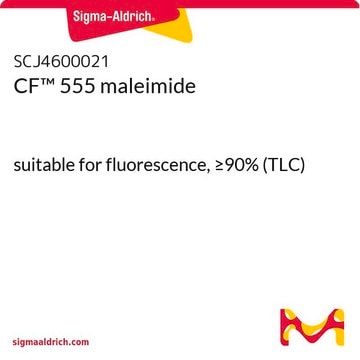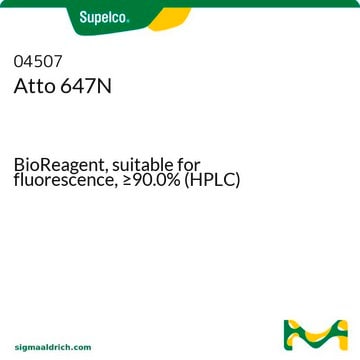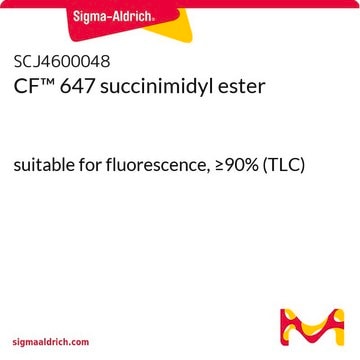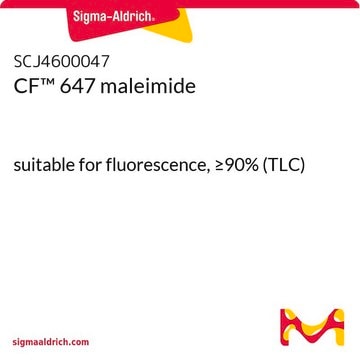05316
Atto 647N maleimide
BioReagent, suitable for fluorescence, ≥90% (HPLC)
Sign Into View Organizational & Contract Pricing
All Photos(1)
About This Item
Recommended Products
product line
BioReagent
Assay
≥90% (HPLC)
≥90% (degree of coupling)
manufacturer/tradename
ATTO-TEC GmbH
λ
in ethanol (with 0.1% trifluoroacetic acid)
UV absorption
λ: 640-646 nm Amax
suitability
suitable for fluorescence
detection method
fluorometric
storage temp.
−20°C
Application
- Preparation of homogeneous samples of double-labelled protein suitable for single-molecule FRET measurements.: This study explores the use of Atto 647N maleimide for the preparation of homogeneously double-labelled protein samples, facilitating precise single-molecule FRET measurements to analyze protein dynamics and interactions (Lerner et al., 2013).
Legal Information
This product is for Research use only. In case of intended commercialization, please contact the IP-holder (ATTO-TEC GmbH, Germany) for licensing.
Storage Class Code
11 - Combustible Solids
WGK
WGK 3
Flash Point(F)
Not applicable
Flash Point(C)
Not applicable
Personal Protective Equipment
dust mask type N95 (US), Eyeshields, Gloves
Certificates of Analysis (COA)
Search for Certificates of Analysis (COA) by entering the products Lot/Batch Number. Lot and Batch Numbers can be found on a product’s label following the words ‘Lot’ or ‘Batch’.
Already Own This Product?
Find documentation for the products that you have recently purchased in the Document Library.
Customers Also Viewed
Marina I Giannotti et al.
Biomacromolecules, 12(7), 2524-2533 (2011-05-25)
Nanopharmaceutics composed of a carrier and a protein have the potential to improve the activity of therapeutical proteins. Therapy for lysosomal diseases is limited by the lack of effective protein delivery systems that allow the controlled release of specific proteins
S E D Webb et al.
Optics express, 16(25), 20258-20265 (2008-12-10)
We combine single molecule fluorescence orientation imaging with single-pair fluorescence resonance energy transfer microscopy, using a total internal reflection microscope. We show how angles and FRET efficiencies can be determined for membrane proteins at the single molecule level and provide
STED microscopy to monitor agglomeration of silica particles inside A549 cells.
Schubbe, S., et al.
Advanced Engineering Materials, 12, 417-422 (2010)
Harpreet Singh et al.
Mitochondrion, 12(2), 230-236 (2011-10-11)
The visualization and quantification of mitochondria-associated proteins with high power microscopy methods is of particular interest to investigate protein architecture in this organelle. We report the usage of a custom-made STimulated Emission Depletion (STED) fluorescence nanoscope with ~30nm lateral resolution
A novel nanoscopic tool by combining AFM with STED microscopy.
Harke, B., et al.
Optical Nanoscopy, 1, 3-3 (2012)
Our team of scientists has experience in all areas of research including Life Science, Material Science, Chemical Synthesis, Chromatography, Analytical and many others.
Contact Technical Service





